Over the past two weeks in a small Lebanese village, I’ve gotten to know a number of Syrians, including a family from the Hasaka region in eastern Syria who’ve been pushed out of their village. He was an elementary school teacher for nearly 3 decades. They grew vegetables, had some chickens, lived reasonably happily.
They returned six months ago, yearning to see their country, their home. But most people they knew had left, driven out by foreign terrorists. There was nothing left to return to.
He works hard at his menial job, back straight, whistling a song from his memories, always cheerful in spite of his losses. Over coffee he shares stories and laughs, reminisces now and then about his former work and how the terrorists have ruined even schooling in his area. Sometimes he emotes the regretful “ach” I’ve heard so many times in Gaza, Palestine. “Ach, ya Eva, kan el hia helua.” Life was so good before…
She tells me of her siblings and parents who are emigrating abroad, gotten visas to a new life, no way of living here, no means of returning to their homes. “If I return to Syria it will only be to visit,” she says. Everyone she loves has moved away. “Am I going to return to sit alone?”
Their two kids help out with work but are otherwise in limbo, not able to continue university here…no money to do so. In Syria, it was virtually free.
Her words:
“We never thought we’d leave Syria, life was good. Everything was cheap, we had security. But we eventually had to…. not because of the government or the Syrian Army, because of the terrorists, mostly al-Nusra then. Now Daesh are there too, but they’re the same anyway.
Before we left, it had gotten to the point where we scarcely had access to water, had little electricity… The terrorists destroyed the power lines. The municipality would repair things and the terrorists would return and destroy them.
Two weeks before we left, they blew up a car belonging to an important person in the government in our area. He lived down the street, between our house and the school. My daughter was at school, I was so afraid that she had been hurt.
When we left, we thought it would would only be temporarily, but every day since it has gotten worse.
We went back six months ago, to see if it was possible to return for good. Everything different, many shops were closed down and the water and electricity were even worse. Everything was worse than ever. As soon as it got dark, the streets were empty. Those of our neighbours who had remained were different too, gaunt, faces drawn.”
They’ve lost so much—understatement—and yet, as with Palestinians who’ve endured Nakba after ongoing Nakba and genocide, have lost so much, they are so generous, humble, strong.
I was pleased when she said, “inti min ahl el beit” (approximate translation: you’re one of the family), but truthfully I’ll never know how it feels to be shoved out of my home and country, let alone endure the horrors they have.
…He gifted me a washcloth one day, made in S.A.R. and told me that many of the things here are from Syria, because they are less expensive and top quality.
She told me this morning of how they’d both sobbed when watching the news yesterday, learning of Daesh’s sadistic
beating and stomping to death of three Syrian soldiers in Raqqa by the west’s “rebels”.
He spoke of the faux-revolution. “’We want freedom,’ they said. What freedom do they want? We had education, health care, security. This is the ‘freedom’ they want, these terrorists destroying our towns, our culture?”
Even though they have left and feel that they cannot go back, they are patriots, are proud of their country and culture, and its voices like theirs we need to be hearing: the people who know what’s happening on the ground, who are not being fed soundbites by corporate media or funded by the various thinktank incarnations of Soros’ foundations but who live/lived in Syria and suffered the draconian takeover of foreign terrorists; the people who support the Syrian army and President Assad because they choose to, who enacted the democracy they choose, not that which the death squads of the west attempt to deliver.
I hope that she is wrong about something, though. I hope they do return to Syria, where they left their hearts.
Musician from Sweida:
















No comments:
Post a Comment